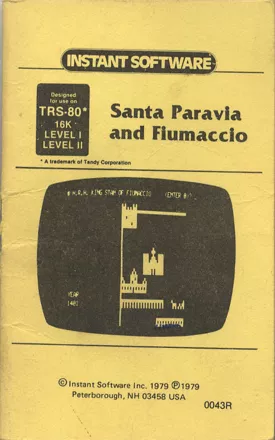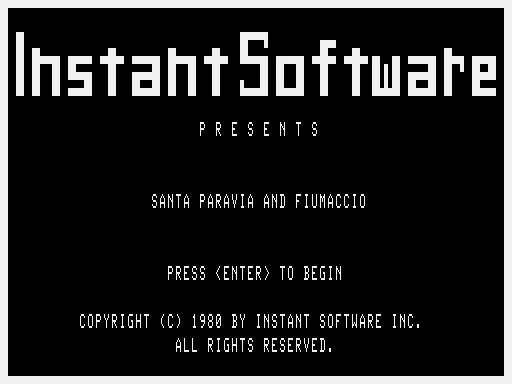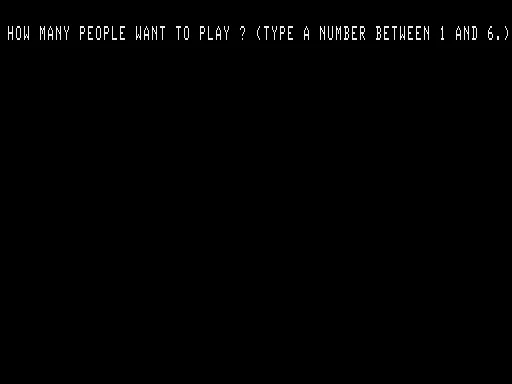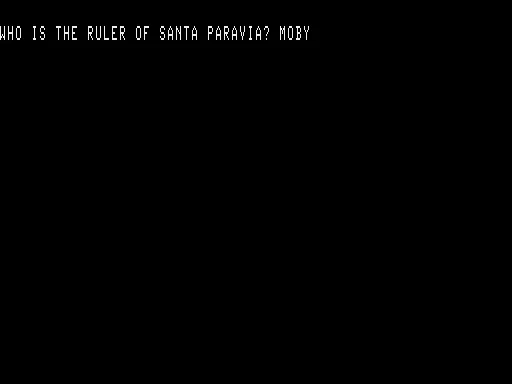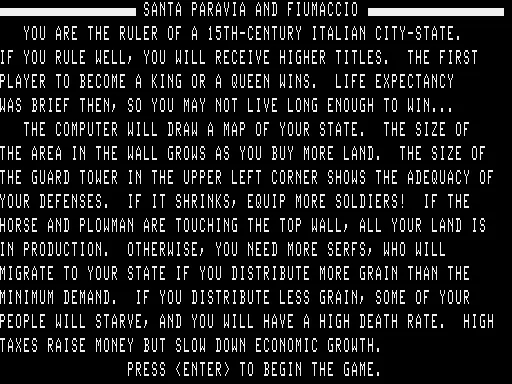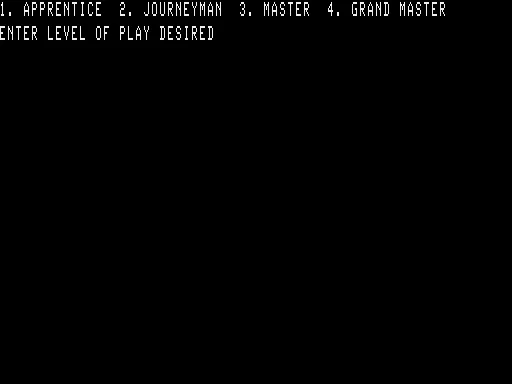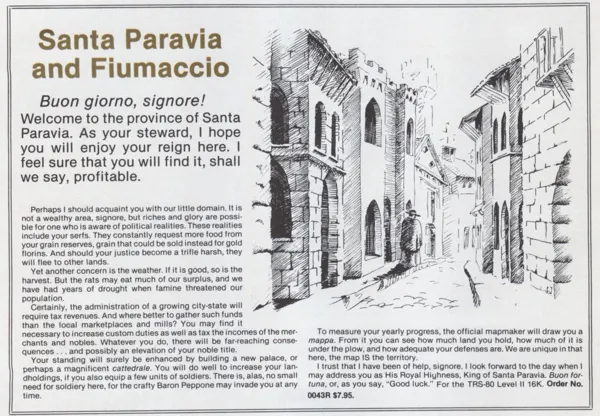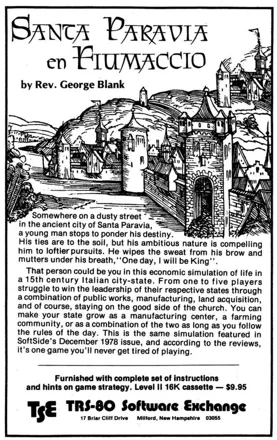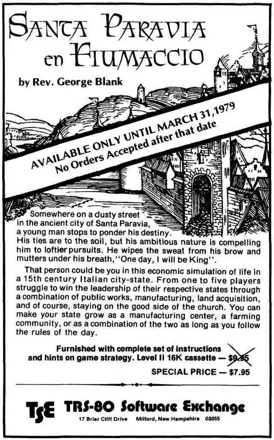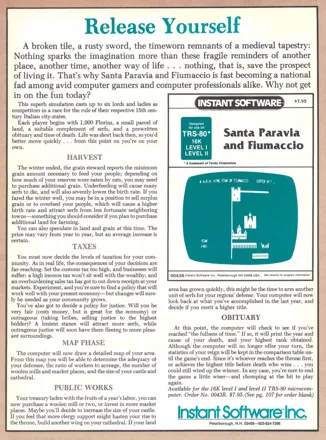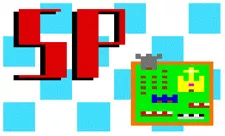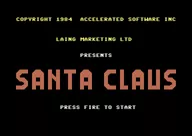Santa Paravia and Fiumaccio
-
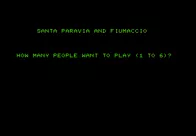 Santa Paravia and Fiumaccio
(1978 on
Commodore PET/CBM, 1990 on
Commodore 64)
Santa Paravia and Fiumaccio
(1978 on
Commodore PET/CBM, 1990 on
Commodore 64)
-
 Santa Paravia and Fiumaccio
(1988 on
Amiga,
Atari ST,
Commodore 64)
Santa Paravia and Fiumaccio
(1988 on
Amiga,
Atari ST,
Commodore 64)
-
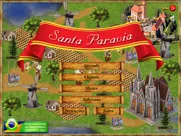 Santa Paravia and Fiumaccio
(1999 on
Windows)
Santa Paravia and Fiumaccio
(1999 on
Windows)
-
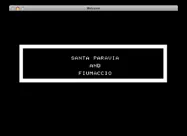 Santa Paravia and Fiumaccio
(2003 on
Macintosh)
Santa Paravia and Fiumaccio
(2003 on
Macintosh)
-
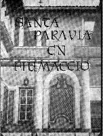 Santa Paravia and Fiumaccio
(2006 on
Browser)
Santa Paravia and Fiumaccio
(2006 on
Browser)
Description
An intermediary step in complexity between the brutally basic HAMURABI and more sophisticated modern titles such as Civilization, Santa Paravia and Fiumaccio ushers you into a Merchant Prince setting, governing over a 15th-century Italian city-state, competing with the savage forces of nature and against up to 5 (7 in some later versions) other players in the hot-seat, seeing who can rise through the ranks to claim titles from COUNT, to MARQUIS, GRAND DUKE (and, finally, H.R.H. KING).
At its heart the game is, as are its predecessors, about bean-counting -- weighing your current reserves of grain (measured in steres) against your population's food demands, wondering how many gold florins the market price for your surplus will net, and how many hectares of land that'll permit you to purchase... and whether that investment will come back to haunt you the following turn if the weather shifts from feast to famine, when you have plenty of dirt and nothing growing in it to feed your grumbling populace. However, the game cleans up real nice, and cute graphical depictions may help you to forget that your debauched Renaissance rule largely consists of moving debits and credits back and forth across a virtual ledger.
Varying difficulty levels help you find your own comfort zone in which to engage bad harvest conditions, worse real-estate prices and, worst of all, the endless appetites of what must amount to hundreds of thousands of rats, endlessly nibbling at your reserves. Surplus capital can be sunk into blue-chip investments such as marketplaces and mills, palaces, cathedrals and private armies. If, after commissioning them all, you find you don't have so much surplus capital after all, you can always cook the books by adjusting several different flavours of taxes, tariffs and customs fees... but tamper too much and your local economy will be stifled!
Nearly every downturn in this game has an equal and opposite check, or at least a balance, to keep it from demolishing your estate in a single swoop... however, early versions of this game, as with many titles of its era, may cruelly and arbitrarily cut your rule short with a random death. All the more reason to carpe diem and do the best with what you've got, while you've got it.
Groups +
Screenshots
Promos
Credits (TRS-80 version)
| by |
Reviews
Critics
Average score: 80% (based on 1 ratings)
Players
Average score: 3.3 out of 5 (based on 6 ratings with 0 reviews)
Be the first to review this game!
Trivia
Difficulty
This game is less demanding than its predecessor HAMURABI: on the easiest skill level it is possible to win by solely falling back on the default values suggested (or, as code-porter Thomas Knox put it, "If you're on the Apprentice level and just keep smacking Enter, you will eventually win.") However, while this technique will succeed, it only does so gradually -- in a multiplayer game, virtually any right-headed human input by a competitor will trump this approach, relegating its timid advocate to runner-up status, at best.
Source code
Thomas Knox ported this game (with permission) from George Blank's original TRS-80 BASIC to ANSI-C in 2000, releasing it under the GNU General Public License; this code was the basis for modern Windows, OSX and Linux releases of this game and can be read or downloaded here.
Analytics
Related Sites +
-
The fascinating story of Santa Paravia and Fiumaccio
Article with the story of the game and links to the different versions and available source codes
Identifiers +
Contribute
Are you familiar with this game? Help document and preserve this entry in video game history! If your contribution is approved, you will earn points and be credited as a contributor.
Contributors to this Entry
Game added by Pseudo_Intellectual.
Matsushita/Panasonic JR added by vedder.
Additional contributors: Alaka, Emanuele Bolognesi.
Game added May 10, 2006. Last modified October 8, 2024.


